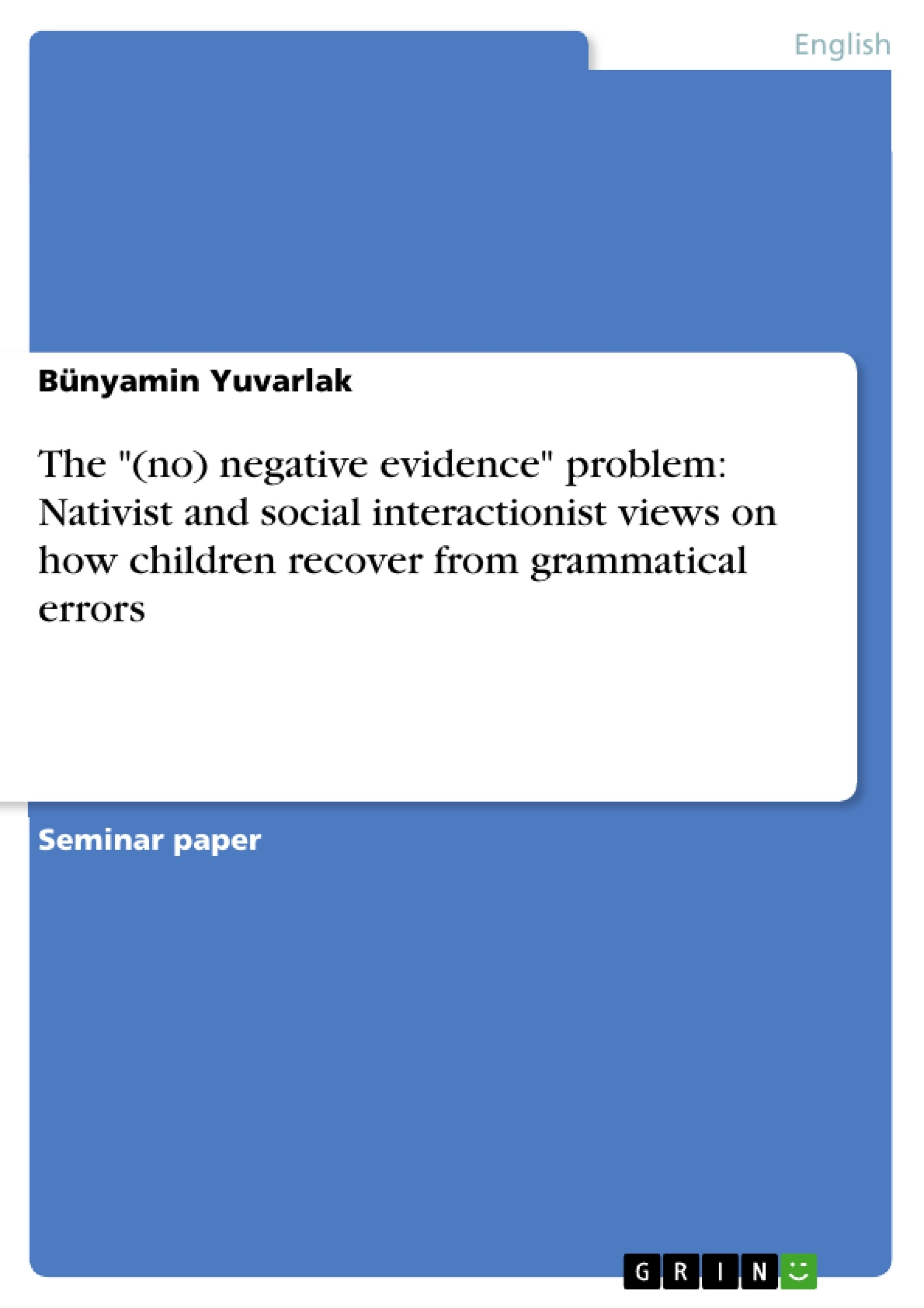This paper aims at exploring how the views on language acquisition have developed over time, where they conflict each other and whether it is possible to position oneself on either side.
The “nature vs nurture” debate is an everlasting discussion, not only in the area of linguistics, but science in general. This is what makes it particularly interesting because there is always new information to expect. Furthermore, it is an issue not limited to academic discourse only, but one that appears in everyday conversation.
An interesting aspect of language acquisition, more specifically the knowledge of language, is the question if children arrive at such knowledge by the mere exposure to “positive evidence”, i.e. the language of adults they are surrounded with, or if negative evidence also has an impact, i.e. children’s knowledge of language is based on explicit or implicit feedback to whether an utterance was in some way incorrect. The two terms will be defined and looked into in more detail in the second chapter.
In the following, the correlation between the “nature vs nurture” debate and language acquisition will be explained first. The respective chapter provides a brief insight into how the nativist approach developed, mainly based on Chomsky’s (1988) notion of “Universal Grammar” (UG), and the type of criticism it brought along. It further explains the connection between the respective theories and the grammatical aspect of language acquisition. In the last section, the main problems of experience-based language learning will be displayed and defined.
The third chapter starts with a section dedicated to where the particular view that humans need innate structures for a correct knowledge of language stems from. It continues with a detailed look on the “(no) negative evidence” problem. The (non-)existence of negative evidence and which role it plays in terms of language acquisition will be explored from different standpoints by nativists as well as non-nativists.
Table of Contents
- Introduction
- Language acquisition: The nature vs nurture debate
- Theoretical background
- Acquisition of grammar
- Negative and positive evidence
- The nativist approach
- Why nativist views exist
- The "(no) negative evidence" problem
- Inconsistency of negative evidence
- Negative evidence as resource for grammar acquisition
- General discussion
- References
Objectives and Key Themes
This paper examines the ongoing debate regarding language acquisition, exploring the contrasting perspectives of nativism and social interactionism. The study aims to delve into the historical development of these views, analyze their points of conflict, and ultimately assess whether a definitive stance can be taken on either side. The paper focuses on the acquisition of grammar and the role of negative evidence in this process, particularly within the context of Chomsky's Universal Grammar theory.
- The nature vs nurture debate in language acquisition
- The nativist approach and Chomsky's Universal Grammar (UG)
- The role of negative evidence in grammar acquisition
- The limitations of experience-based language learning
- The contrasting perspectives of nativists and social interactionists
Chapter Summaries
The first chapter introduces the "nature vs nurture" debate in the context of language acquisition. It establishes the central research question concerning the role of negative evidence in grammatical error correction during language acquisition. This chapter also introduces Chomsky's Universal Grammar (UG) theory and its implications for the nativist approach to language learning.
Chapter two further explores the "nature vs nurture" debate, examining the theoretical foundations of both nativism and social interactionism. It delves into the acquisition of grammar, highlighting the opposing perspectives on how children learn to differentiate between grammatical and ungrammatical structures. This chapter also presents specific challenges associated with acquiring language solely through experience, setting the stage for the focus on negative evidence in later chapters.
Keywords
The primary keywords and focus topics of this paper include language acquisition, nativism, social interactionism, Universal Grammar (UG), negative evidence, grammatical errors, and the "nature vs nurture" debate. These terms represent the core concepts and research areas explored in this study, providing a comprehensive understanding of the theoretical frameworks and empirical findings within the field of language acquisition.
- Quote paper
- Bünyamin Yuvarlak (Author), 2019, The "(no) negative evidence" problem: Nativist and social interactionist views on how children recover from grammatical errors, Munich, GRIN Verlag, https://www.grin.com/document/998187




